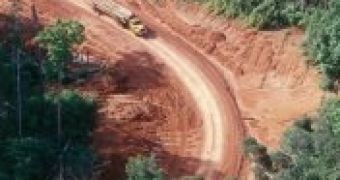A study carried out by the University of Papua New Guinea shows that unless logging is dramatically reduced, at least one half of the forests in Papua New Guinea will be lost in about a decade, which would accelerate the local climate change. Satellite images of the forests taken between 1972 and 2002 show that at the current logging rate, at least 53 percent of the forests will be gone by 2021.
Alternatively, the study that was carried out in collaboration with the Australian National University reveals that even the conservation areas where logging is banned are being affected by local farmers who illegally cut away trees.
"The unfortunate reality is that forests in Papua New Guinea are being logged repeatedly and wastefully with little regard for the environmental consequences and with at least the passive complicity of government authorities", said Phil Shearman, leader of the new study.
Papua New Guinea's tropical forest, which is currently being ranked as the world's third largest, is being logged at a rate of 362,000 hectares per year. Such tropical forests were once sink holes for massive amounts of carbon dioxide gas released by man into the atmosphere. "So the destruction of forest... releases that carbon into the atmosphere", said Shearman, while warning that the rising carbon dioxide levels as a result of logging will have a severe impact on the climate in the local area.
"Papua New Guinea's forests are... of national and regional significance because of their carbon storage factors, they are critically important for the regional stability of our climate. And they also hold probably somewhere between six and 10 percent of the world's biodiversity", he said.
Unless logging is reduced, the consequences as a result of climate change will be significant. "If these trends are allowed to continue for the next 10 or 15 years it will result in significant major proportions of Papua New Guinea's forest being cleared or logged", said Shearman.

 14 DAY TRIAL //
14 DAY TRIAL //